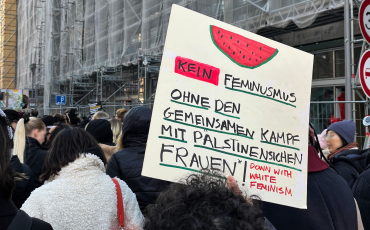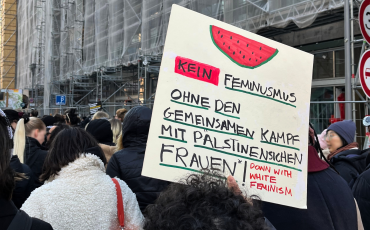If the German position remains that the Palestine-Israel question should be resolved by a two states approach, a much more active differentiation policy is urgently needed, writes Sara Hussaini
On the one hand, the German government and the EU do not recognise Israeli sovereignty over the territories occupied in 1967. Germany, and all other EU member states, do recognise that settlements are illegal under international law. At its very heart, the EU is a project built on the rule of law, human rights, and universal values.
On the other hand, successive Israeli governments have been doing everything possible to erase the Green Line – through the building of settlements and infrastructure, de facto annexation as well as cross-border business, tourism, banking, etc. The reality on the ground has thus become a one state reality, whereby Israel exercises de facto control over all aspects of Palestinian life while maintaining two distinct legal systems within the occupied territories (Palestinians are subjected to a draconian military legal system, whereas Israeli settlers are subject to the same civil legal system as Israelis who live within Israel itself) and according vastly different rights to Israelis and Palestinians. The occupation continues to bear no tangible cost – neither financial nor diplomatic - for the government of Israel, and the majority of Israeli citizens are indifferent to the appalling effects of that occupation on those forced to live under it. The only way to change this reality and create an environment which is conducive to a just and lasting peace – whether through a negotiated two state solution or otherwise – is to see to it that the cost of maintaining the settlement policy outweighs the benefits.
The policy of differentiation, as mandated by Security Council resolution 2334 of December 2016 – that is, differentiating between Israel and Israeli entities in the territories it has occupied since 1967 – is currently implemented in an incomplete manner. If Germany and the EU wish to be credible in their support for a two-state solution and, more importantly, wish to have any chance of keeping this option on the table, then they must apply differentiation policies far more consistently and actively, as well as communicate their motives, objectives and measures more transparently and defend them more clearly.
Some concrete examples of how this could be done:
- Formalize and strengthen guidelines warning businesses of the legal, political, financial and reputational risks of any business activity which enables, facilitates or profits from the construction and growth of settlements. To date, approximately 18 EU member states have some form of guidelines to this effect. These guidelines vary in wording and strength. One of the problems with many of these statements is that they require people to actively seek them out. In the case of Germany, for example, one must search intensively on the website of the Federal Foreign Office (Ministry of Foreign Affairs) to find the guidelines. In 2013, the EU’s Maghreb-Mashreq working group proposed the idea of EU-wide guidelines for businesses, which have still not materialized.
- Develop an active and official discouragement policy by working with specific companies to help them divest their business from entities responsible for violations of international law and human rights abuses associated with Israel’s settlement industrial complex, in the context of corporate social responsibility. To give but two examples: In 2011, the German national railway company Deutsche Bahn withdrew from a contract working on the Israeli A1 train line which runs from Tel Aviv to Jerusalem, cutting into occupied Palestinian land in two places (in the Latrun Valley and near the villages of Beit Iksa and Beit Surik). Deutsche Bahn’s decision came after the German Transport Minister wrote a letter to the CEO of Deutsche Bahn stating that the company’s involvement was “problematic from a foreign policy point of view and potentially breaches international law”.
Meanwhile, HeidelbergCement, through its subsidiary Hanson Israel, has been complicit in expropriating Palestinian resources since 2007. Heidelberg Cement owns 26 concrete plants, three aggregate quarries and two asphalt plants in Israel/Palestine. Two of these businesses are situated on occupied Palestinian land belonging to the village of Zawiya (Salfit Governorate): the Nahal Raba quarry and an integrated asphalt plant. Pillage of resources of an occupied territory is a war crime according to the Rome Statute of the International Criminal Court. Therefore, even though Heidelberg Cement is not a public company, the German government should intervene to ensure that German companies are not engaged in such war crimes.
Tourism is another area where more should be done to differentiate. This is relevant for companies and services related to tourism, including sites such as Booking.com and TripAdvisor, which make no distinction between accommodation, restaurants or other venues in Israel and those run by Israeli entities in occupied Palestinian land. This is also relevant for tour operators and tourism information given in European countries. Often, here, no distinction is made, and tourists who go on trips to Israel have no idea that when they visit Bethlehem, occupied parts of the Dead Sea, East Jerusalem, and other areas, that they themselves are made complicit in the exploitation of Palestinian land, resources and touristic sites.
Therefore, changes are also needed here, such as:
- Advance national (and/or supranational) guidelines for tour operators, ensuring that travel agents and tour operators provide clear information on the legal and political situation in Palestine/Israel.
- Raise awareness about Israeli-run sites, hotels, or other services in occupied Palestinian land, pointing out that these services are linked to Israeli settlements and thus in contravention of international law. Tour operators should be made aware of their potential complicity in human rights abuses and the political, financial and reputational risks associated with this.
- Intervene in cases of false advertising, not only as a matter of EU policy on differentiation, but also as a matter of consumer protection.
Such steps to apply a EU policy of differentiation more consistently and actively must also be supported by a readiness of EU and member states’ representatives to communicate and defend these policies. Ever increasingly, deliberate attempts are made by the defenders of the settlement enterprise to conflate discourse relating to measures against settlements with a boycott of Israel – and to delegitimize both of these approaches by framing them as anti-Semitism. This serves the aim of blocking differentiation and obstructing the possibility of a two-state solution. It is not only insidious but can also serve to distract from genuine cases of anti-Semitism, which, like any form of hate or discrimination, must be addressed and rooted out.
In the current political climate, where a significant rightward shift in both Israeli and US policy is having severe negative repercussions in the Middle East in general and on the Palestine/Israel issue in particular, it is more important than ever to ensure that the integrity and values of the European project are not undermined – for the EU’s own sake, as well as the sake of Palestinians and Israelis alike. The EU and its member states should thus clearly propagate their differentiation policy and the logic behind it: the non-recognition of settlement and annexation policies and the political aim of maintaining the option of a solution through a two-state approach. This is not to be conflated with the popular and non-violent BDS movement’s approach, whatever one’s stance on it, that seeks to put pressure on the State of Israel to comply with international law.
Sara Husseini is a former advisor to the PLO, where she supported senior Palestinian officials across a number of departments, including the PLO Secretary-General in Ramallah and the Palestinian Ambassador to Germany. Her main area of focus is international responsibility vis-a-vis the Palestine-Israel question, specifically the role of Europe.



















